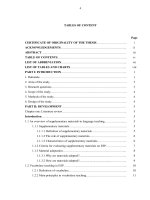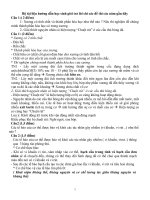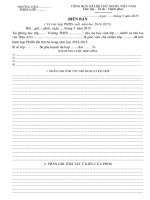tài liệu giảng dạy « website của đinh tiên minh phd
Bạn đang xem bản rút gọn của tài liệu. Xem và tải ngay bản đầy đủ của tài liệu tại đây (732.11 KB, 6 trang )
<span class='text_page_counter'>(1)</span><div class='page_container' data-page=1>
1
Chapter 2
The Marketing Research Process
and Proposals
<i><b>Copyright © 2013 by The McGraw-Hill Companies, Inc. All rights reserved.</b></i>
<i><b>McGraw-Hill/Irwin</b></i>
<b>2-2</b>
Learning Objectives
• Describe the major environmental factors
influencing marketing research
• Discuss the research process and explain the
various steps
• Distinguish between exploratory, descriptive,
and causal research designs
• Identify and explain the major components of
a research proposal
<b>2-3</b>
Changing View of the Marketing
Research Process
• Organizations are increasingly confronted with
new and complex challenges and
opportunities
– Internet is the most influential factor
• Growing emphasis on:
<b>– Secondary data: Information previously collected </b>
for some other problem or issue
</div>
<span class='text_page_counter'>(2)</span><div class='page_container' data-page=2>
<b>2-4</b>
Determining the Need for Information
Research
• Questions a decision maker should ask:
– Can the problem and/or opportunity be resolved
using existing information and managerial
judgment?
– Is adequate information available within the
company’s internal record systems to address the
problem?
– Is there enough time to conduct the necessary
research before the final managerial decision must
be made?
<b>2-5</b>
Determining the Need for Information
Research
– Do the benefits of having the additional
information outweigh the costs of gathering the
information?
– Will the research provide useful feedback for
decision making?
– Will this research give our competitors too much
information about our marketing strategy?
</div>
<span class='text_page_counter'>(3)</span><div class='page_container' data-page=3>
3
<b>2-7</b>
Overview of the Research Process
• Phases of the research process are guided by
the scientific method
<b>– Scientific method: Research procedures should be </b>
logical, objective, systematic, reliable, and valid
<b>2-8</b>
Exhibit 2.2 - The Four Phases of the
Information Research Process
<b>2-9</b>
Transforming Data into Knowledge
</div>
<span class='text_page_counter'>(4)</span><div class='page_container' data-page=4>
<b>2-10</b>
Exhibit 2.4 - Phases and Steps in the
Information Research Process
<b>2-11</b>
Relevant Key Terms in the Information
Research Process
Iceberg principle Decision makers are aware of only 10 percent of the true
problem
Situation
analysis
Gathers and synthesizes background information to familiarize
the researcher with the overall complexity of the problem
Unit of analysis Specifies whether data should be collected about individuals,
households, organizations, departments, geographical areas, or
some combination
Exploratory
research
Generates insights that will help define the problem situation
confronting the researcher or improves the understanding of
consumer motivations, attitudes, and behavior that are not easy
to access using other research methods
Relevant Key Terms in the Information
Research Process
Descriptive
research
Collects quantitative data to answer research questions such as
who, what, when, where, and how
Causal research Collects data that enables decision makers to determine
cause-and-effect relationships between two or more variables
Target
population
</div>
<span class='text_page_counter'>(5)</span><div class='page_container' data-page=5>
5
<b>2-13</b>
Exhibit 2.5 - The Iceberg Principle
<b>2-14</b>
Develop a Research Proposal
<b>• Research proposal: Document that provides </b>
an overview of the proposed research and
methodology
– Serves as a written contract between the decision
maker and the researcher
<b>2-15</b>
</div>
<span class='text_page_counter'>(6)</span><div class='page_container' data-page=6>
<b>2-16</b>
Exhibit 2.8 - General Outline of a
Research Proposal
<b>2-17</b>
Marketing Research in Action:
What Does a Research Proposal Look Like?
• If a proposal is accepted, will it achieve the
objectives of management?
• Is the target population being interviewed the
appropriate one?
• Are there other questions that should be
asked in the project?
</div>
<!--links-->









